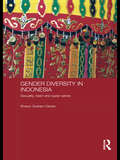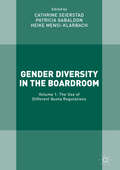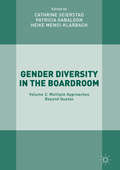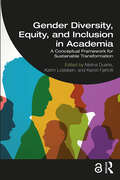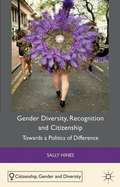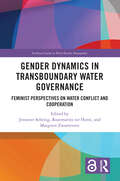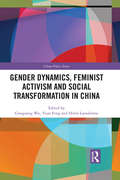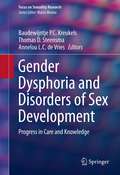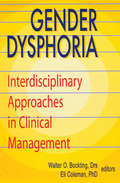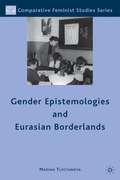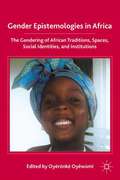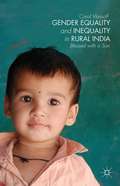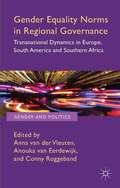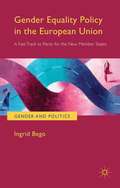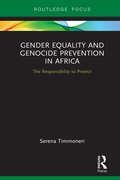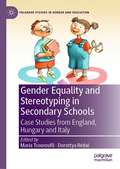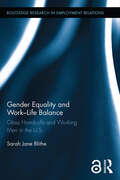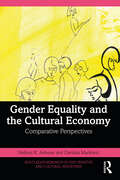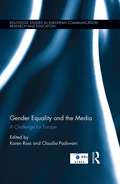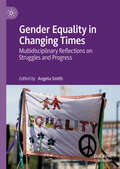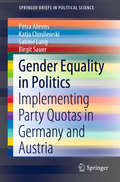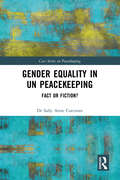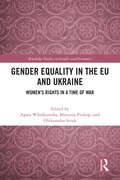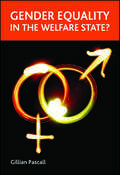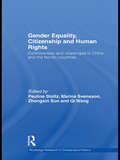- Table View
- List View
Gender Diversity in Indonesia: Sexuality, Islam and Queer Selves (ASAA Women in Asia Series)
by Sharyn Graham DaviesIndonesia provides particularly interesting examples of gender diversity. Same-sex relations, transvestism and cross-gender behaviour have long been noted amongst a wide range of Indonesian peoples. This book explores the nature of gender diversity in Indonesia, and with the world’s largest Muslim population, it examines Islam in this context. Based on extensive ethnographic research, it discusses in particular calalai – female-born individuals who identify as neither woman nor man; calabai – male-born individuals who also identify as neither man nor woman; and bissu – an order of shamans who embody female and male elements. The book examines the lives and roles of these variously gendered subjectivities in everyday life, including in low-status and high-status ritual such as wedding ceremonies, fashion parades, cultural festivals, Islamic recitations and shamanistic rituals. The book analyses the place of such subjectivities in relation to theories of gender, gender diversity and sexuality.
Gender Diversity in the Boardroom
by Cathrine Seierstad Patricia Gabaldon Heike Mensi-KlarbachThis edited collection provides a structured and in-depth analysis of the current use of multiple approaches beyond quotas for resolving the pressing issue of gender inequality, and the lack of female representation on corporate boards. Filling the gap in existing literature on this topic, the two volumes of Gender Diversity in the Boardroom offers systematic overviews of current debates surrounding the optimisation of gender diversity, and the suggested pathways for progress. Focusing on sixteen European countries, the skilled contributors explore the current situation in relation to women on boards debates and approaches taken. They include detailed reflections from critical stakeholders, such as politicians, practitioners and policy-makers. Volume 2 focuses on eight European countries having multiple approaches beyond quotas and is a promising and highly valuable resource for academics, practitioners, policy makers and anyone interested in gender diversity because it examines and critiques the current corporate governance system and national strategies for increasing the share of women not only on boards, but within companies beyond the boardroom.
Gender Diversity in the Boardroom
by Cathrine Seierstad Patricia Gabaldon Heike Mensi-KlarbachThis edited collection provides a structured and in-depth analysis of the current use of multiple approaches beyond quotas for resolving the pressing issue of gender inequality, and the lack of female representation on corporate boards. Filling the gap in existing literature on this topic, the two volumes of Gender Diversity in the Boardroom offers systematic overviews of current debates surrounding the optimisation of gender diversity, and the suggested pathways for progress. Focusing on sixteen European countries, the skilled contributors explore the current situation in relation to women on boards debates and approaches taken. They include detailed reflections from critical stakeholders, such as politicians, practitioners and policy-makers. Volume 2 focuses on eight European countries having multiple approaches beyond quotas and is a promising and highly valuable resource for academics, practitioners, policy makers and anyone interested in gender diversity because it examines and critiques the current corporate governance system and national strategies for increasing the share of women not only on boards, but within companies beyond the boardroom.
Gender Diversity, Equity, and Inclusion in Academia: A Conceptual Framework for Sustainable Transformation
by Melina Duarte Katrin Losleben Kjersti FjørtoftInstitutional focus on diversity, equity, and inclusion affects all parts of higher education management. Gender Diversity, Equity, and Inclusion in Academia: A Conceptual Framework for Sustainable Transformation scrutinises the conceptual framework for diversity, equity, and inclusion actions in academia to facilitate research-based and critically reflected decisions in higher education management. The book contains 24 chapters, each focused on one of 24 fundamental concepts that are essential for identifying, understanding, and implementing organizational changes and counteracting unjustified disadvantages faced by women and members of other gender minorities in academia, preceded by an introductory binding chapter. The book also discusses concepts directed towards solutions, such as affirmative action and feminist pedagogies, and overcomes the traditional binary approach on gender by incorporating specific challenges faced by LGBTQ+ and transgender staff and students. Gender Diversity, Equity, and Inclusion in Academia will be key reading for academics in Gender Studies and Education Studies, while also serving as a vital resource for individual consumers working in or preparing to enter leadership positions in higher education.
Gender Diversity, Recognition and Citizenship
by Sally HinesThis book examines the meanings and significance of the UK Gender Recognition Act within the context of broader social, cultural, legal, political, theoretical and policy shifts concerning gender and sexual diversity, and addresses current debates about equality and diversity, citizenship and recognition across a range of disciplines.
Gender Dynamics in Transboundary Water Governance: Feminist Perspectives on Water Conflict and Cooperation (Earthscan Studies in Water Resource Management)
by Jenniver Sehring Rozemarijn ter Horst and Margreet ZwarteveenThis volume assesses the nexus of gender and transboundary water governance, containing empirical case studies, discourse analyses, practitioners’ accounts, and theoretical reflections. Transboundary water governance exists at the intersection of two highly masculinised fields: diplomacy and water resources management. In both fields, positions are mainly held by men, and core ideas, norms, and guiding principles that are presented as neutral, are both shaped by men and based on male experiences. This book sheds light on the often hidden gender dynamics of water conflict and cooperation at the transboundary level and on the implicit assumptions that guide research and policies. The individual chapters of the book, based on case studies from around the world, reveal the gendered nature of water diplomacy, take stock of the number of women involved in organisations that govern shared waters, and analyse programmes that have been set up to promote women in water diplomacy and the obstacles that they face. They explore and contest leading narratives and knowledge that have been shaped mainly by privileged men, and assess how the participation of women concretely impacts the practices, routines, and processes of water negotiations. This volume will be of great interest to students and scholars of water governance, water diplomacy, gender, international relations and environmental politics. It will also be of interest to professionals and policymakers involved in supporting gender mainstreaming in water cooperation.
Gender Dynamics, Feminist Activism and Social Transformation in China (China Policy Series)
by Guoguang Wu Yuan Feng Helen LansdowneThis book explores the extent to which women have been initiators, mobilizers, and driving forces of social transformation in China. The book considers how conceptions of women’s roles have changed as China has moved from state socialism to engagement with capitalist globalization, examines the growth of women’s gender and sexual consciousness and social movements for women’s rights, including for marginalized social and sex/gender grouops, and discusses women’s roles in society-state interactions, including many forms of social activism, cultural events, educational innovations, and more. Overall, the book demonstrates that women have not simply been passive receivers of the consequences of the forces of global capitalism, but that they have had a profound, active impact on social transformation in China.
Gender Dysphoria and Disorders of Sex Development: Progress in Care and Knowledge
by Baudewijntje P.C. Kreukels Thomas D. Steensma Annelou L.C. de VriesThis book provides a state of the art review on the care and treatment of and current scientific knowledge on gender dysphoria (GD) and disorders of sex development (DSD). The book elucidates the history, the present situation, and the newest developments and future perspectives in both research on GD and DSD and the clinical management of individuals with GD and DSD of all ages. With contributions from a selection of leading scientists and established clinicians in the field of GD and DSD, this is a unique and comprehensive book focusing on the etiology and developmental trajectories of GD and DSD regarding gender identity development, psychiatric comorbidity, classification dilemmas, ethical dilemmas in treatment, influences of societal stigmatization, and discussion of the medical and psychological implications and outcomes of treatment, and providing treatment guidelines for individuals with GD and DSD (distinct guidelines each for children, adolescents, and adults). By presenting not only an historic overview and the current state of the art, but also challenges for the future, the book aims to demonstrate the need for further research and to stimulate the development and improvement of the clinical care of individuals with GD and DSD.
Gender Dysphoria: Interdisciplinary Approaches in Clinical Management
by Edmond J Coleman Walter O BocktingAn exploration of the diverse presentations of gender dysphoria and how it affects an individual's physical, psychological, social, and sexual adjustment, Gender Dysphoria provides comprehensive and applicable treatment approaches available for a wide spectrum of presentations of this disorder. The need for evaluating and treating gender dysphoria in the context of the gender dysphoric client's overall mental and physical health is stressed. International experts in the clinical management of gender dysphoria contribute valuable information on contemporary approaches in assessment, psychological and medical treatment, and adjustment of individuals with gender identity disorders. In Gender Dysphoria, clinicians will find important information on hormone therapy options and their physical results and side effects, and the effectiveness of sex reassignment surgery in improving a gender dysphoric client's adjustment. This comprehensive book covers a wealth of topics essential for clinicians who treat gender dysphoria, including:terminology and classification of gender identity disordersa validation of the “Cross-Gender Questionnaire,” a newly developed clinical assessment toolreported regrets of post-surgical transsexualsthe affective component of gender dysphoria in young boysa model for identifying and treating gender identity disorder in femalesa thorough description of a comprehensive treatment approach for a wide spectrum of presentations of gender dysphoria Filled with useful information on the clinical management of gender identity disorders, Gender Dysphoria meets the practical needs of clinical sexologists, psychotherapists, counselors, social workers, physicians, sex researchers, social scientists, and specialists who evaluate and treat gender dysphoria.
Gender Epistemologies and Eurasian Borderlands
by Madina TlostanovaTlostanova examines Central Asia and the Caucasus to trace the genealogy of feminism in those regions following the dissolution of the USSR. The forms it takes resist interpretation through the lenses of Western feminist theory and woman of color feminism, hence Eurasian borderland feminism must chart a third path.
Gender Epistemologies in Africa
by Oyèrónké OyěwùmíThis volume brings together a variety of studies that are engaged with notions of gender in different African localities, institutions and historical time periods. The objective is to expand empirical and theoretical studies that take seriously the idea that in order to understand gender and gender relations in Africa, we must start with Africa.
Gender Equality And Inequality In Rural India
by Carol VlassoffThe status of women is how the society perceives a women and not what it should be. Women at every stage are deprived of opportunities because of their sexuality. This book is a small step towards the realization of the fragrance called woman and to accept the Kasturi that is the inherent quality of a woman.
Gender Equality Norms In Regional Governance
by Anna Van Der Vleuten Anouka Van Eerdewijk Conny RoggebandThis book analyses the diffusion of norms concerning gender-based violence and gender mainstreaming of aid and trade between the EU, South America and Southern Africa. Norm diffusion is conceptualized as a truly multidirectional and polycentric process, shaped by regional governance and resulting in new geometries of transnational activism.
Gender Equality Policy in the European Union
by Ingrid BegoThis book examines the role that the European Union (EU) has played in enhancing democratic values in new member states by requiring the adoption of gender equality laws, such as equal employment and reconciliation policies, in return for membership. Considering four EU member states in Central Eastern Europe - Bulgaria, Czech Republic, Latvia and Poland - it debates if and under what conditions the incentives for EU membership positively affected the successful adoption and implementation of gender equality policies. The book looks at the role of formal and informal domestic institutions to understand successful alliances in each case study, and considers the dynamic relationship between domestic and international actors in the context of global governance. Engaging with the study of public policy, this book discusses how the EU is capable of successful promotion of human rights and democratic values in general and provides insight on how any supranational organization can establish effective incentive structures to produce desired outcomes.
Gender Equality and Genocide Prevention in Africa: The Responsibility to Protect
by Serena TimmoneriThis book investigates what impact gender equality has on genocide in Africa, to verify whether it is a missing indicator from current risk assessments and models for genocide prevention. Examining whether States characterised by lower levels of gender equality are more likely to experience genocide, Timmoneri adds gender indicators to the existing early warning assessment for the prevention of genocide. Moreover, the book argues for the formulation of policies directed at the improvement of gender equality not just as a means to improve women's conditions but as a tool to reduce the risk of genocide and mass atrocities. Using case studies from Nigeria, Ethiopia, Angola, Uganda, and Burundi, Timmoneri analyses recent atrocities and explores the role of gender equality as an indicator of potential genocide. Gender Equality and Genocide Prevention in Africa will be of interest to students and scholars of political science, genocide studies, and gender studies.
Gender Equality and Stereotyping in Secondary Schools: Case Studies from England, Hungary and Italy (Palgrave Studies in Gender and Education)
by Maria Tsouroufli Dorottya RédaiThis book explores gender stereotyping and gender inequalities in secondary education in England, Hungary and Italy. The authors highlight the importance of addressing student and teacher attitudes if long-term changes in mindset are desired, as well as the underlying stereotypes that persist and linger in these educational contexts. Promoting a whole-school culture change approach, this book explores views of gender stereotypes from teachers and students concerning subject and career choices, as well as collaborative work with teachers, experts and NGOs in implementing and evaluating gender equality charters. Drawing on extensive research, this book employs an intersectional and cross-country approach: while the authors acknowledge the challenges and opportunities of researching gender equality frameworks across different countries, ultimately these link to the UN Sustainable Development goal of gender equality.
Gender Equality and Work-Life Balance: Glass Handcuffs and Working Men in the U.S. (Routledge Research in Employment Relations)
by Sarah BlithePressure to achieve work-life "balance" has recently become a significant part of the cultural fabric of working life in United States. A very few privileged employees tout their ability to find balance between their careers and the rest of their lives, but most employees face considerable organizational and economic constraints which hamper their ability to maintain a reasonable "balance" between paid work and other life aspects—and it is not only women who struggle. Increasingly men find it difficult to "do it all." Women have long noted the near impossibility of balancing multiple roles, but it is only recently that men have been encouraged to see themselves beyond their breadwinner selves. Gender Equality and Work-Life Balance describes the work-life practices of men in the United States. The purpose is to increase gender equality at work for all employees. With a focus on leave policy inequalities, this book argues that men experience a phenomenon called "the glass handcuffs," which prevents them from leaving work to participate fully in their families, homes, and other life events, highlighting the cultural, institutional, organizational, and occupational conditions which make gender equality in work-life policy usage difficult. This social justice book ultimately draws conclusions about how to minimize inequalities at work. Gender Equality and Work-Life Balance is unique as it laces together some theoretical concepts which have little previous association, including entrepreneurialism; leave policy, occupational identity, and the economic necessities of families. This book will therefore be of particular interest to researches and academics alike in the disciplines of Gender studies, Human Resource Management, Employment Relations, Sociology and Cultural Studies.
Gender Equality and the Cultural Economy: Comparative Perspectives (Routledge Research in the Creative and Cultural Industries)
by Helmut K. Anheier Darinka MarkovicThe status of women in the creative and cultural industries remains precarious. This comparative analysis provides insights from seven key economies to help understand progress towards gender equality in culture and the arts and the broader cultural economy.With empirical and policy analysis spanning Europe and the US, the authors investigate the extent to which gender equality has entered the mainstream along dimensions of leadership, access and awards, pay and pension gaps, work-life balance, and the monitoring of gender equality. While many of the structural barriers have been erased, countries differ significantly in how much gender equality has been achieved in the creative economy and how much female talent is lost and unrecognized.This book is essential reading for scholars, policymakers, and practitioners across the human and social sciences, especially those involved with arts management and the creative or cultural economy more broadly.
Gender Equality and the Media: A Challenge for Europe (Routledge Studies in European Communication Research and Education)
by Karen Ross Claudia PadovaniThis edited collection draws on and expands the findings from a pan-European research project undertaken during 2012-13 which was funded by the European Institute for Gender Equality and aimed to explore three key issues in relation to gender and media: women’s inclusion in decision-making positions within media industries; how women are represented in the media; and what policies and mechanisms are in place to support women’s career development and promote gender equality. The research looked at 99 major media organisations across the EU including public and private sector broadcasters (TV and radio) as well as a number of major newspaper groups. Researchers also monitored TV programmes (factual only but including entertainment genres) across one week and coded 1200 hours of TV. In addition to elaborating the results from 16 of the participating nations, the collection includes a set of context-setting essays and a summarizing conclusion as well as a reflection on the purpose and utility of gender indicators. It is the first major work to look across the European media landscape and explore both employment and representation, providing a unique glimpse into the contemporary media scene in relation to gender equality, including examples of good and less good practice.
Gender Equality in Changing Times: Multidisciplinary Reflections on Struggles and Progress
by Angela SmithThis edited collection explores issues of gender equality in the global context. Campaigns to achieve gender equality throughout the twentieth century brought about huge changes in westernised countries. In particular, the achievements of second-wave feminism with regards to gender and sexual equality benefit many people today. The famous 'seven demands' of the second-wave movement form the basis of the chapters of this book, probing the advances made legally, socially and culturally. Contributors to this collection acknowledge the advances brought about by the second-wave movement, but highlight the work which still needs to be done in the twenty-first century, including the changes in society that have resulted in shifts in masculinity. Gender Equality in Changing Times is divided into two parts, following an overview of theoretical debates and social contexts that lead us to the current period of gender and sexual relations. Part One looks at gender equality by exploring the 'experience' of being part of a group where gender boundaries still exist, drawing on auto-ethnographies of those in key groups that are central to this debate, as well as interviews with members of such groups. Part Two investigates wider representations of these groups, offering an insight into the geopolitical world of gender relations in Saudi Arabia and China. Ultimately, this collection shows how much has been achieved, yet how far is also left to go. Students and scholars across a range of disciplines, including gender studies, history, education, sociology, media studies, politics, business studies, cultural studies and English literature and linguistics, will find this book of interest.
Gender Equality in Politics: Implementing Party Quotas in Germany and Austria (SpringerBriefs in Political Science)
by Sabine Lang Petra Ahrens Birgit Sauer Katja ChmilewskiThis book provides a timely and unique contribution to current debates on how effectively voluntary party quotas address the persistent underrepresentation of women in legislatures. Using a most similar case design and a mixed-methods approach, the authors draw attention to the ways in which electoral systems and party regulations interface with voluntary party quotas in Germany and Austria. All quota parties in these countries support the goal of equal participation of women and men in elected office, and quotas are presented as a means to precisely that end. In order to assess parties’ commitment to their declared goals, and the effectiveness of quotas, the book introduces the concept of the post-quota gender gap and defines it as the difference between a party’s adopted quota and the actual share of women in legislative bodies at the national and regional level. Complementing the existing literature on recruitment and socio-cultural legacies, the authors argue that the problem of voluntary party quotas lies at the intersection of party quota design and electoral law. Either parties need to design quotas that actually work within a given electoral system, or we need legislative action geared toward advancing parity not just in candidate selection, but in the composition of legislatures. The book draws on gendered candidate and election data, on the party statutes of federal and state-level party organizations, and on interviews with party officials and party women’s organizations.
Gender Equality in UN Peacekeeping: Fact or Fiction? (ISSN)
by Sally Anne CorcoranThis book investigates to what extent UNSCR 1325/WPS agenda has functioned in practice, to advance women’s equality and empowerment in the peacekeeping context and beyond.The book examines whether widespread implementation of UNSCR 1325 and the broader WPS agenda via gender mainstreaming in UN operations has translated into increased gender equality in peacekeeping operations, the broader UN institutional context and, by extension, the host countries in which missions are situated, via norm dissemination. The book investigates this via a review of the implementation of UNSCR1325 in the operations chosen as research sites over three snapshot years. The book undertakes a comparative analysis that scrutinizes if, how and under what conditions gender mainstreaming has succeeded as a strategy to advance gender equality by analyzing the factors/conditions that have led to successful gender mainstreaming across the operational context, and those that have impeded this outcome. The book concludes that, despite rhetorical commitments to women’s equality in peacekeeping since the passage of UNSCR 1325, progress on the ground has remained minimal, and that the operational environment continues to be discriminatory against women. Both quantitatively and qualitatively, women do not participate as equal partners in peacekeeping and continue to have less access to resources and decision-making power, overall. The book interrogates that by exploring the spaces available within law, policy and practice of the UN to pursue the human rights agenda of gender equality and considers whether UNSCR 1325 has enlarged those spaces. It also points to the irony of internal UN structures failing to adequately adapt to their own gender mainstreaming mandates, while those same structures have delivered some gender equality mandates successes externally, at local levels.This book will be of interest to students of peacekeeping, gender studies, and International Relations.
Gender Equality in the EU and Ukraine: Women’s Rights in a Time of War (Routledge Studies in Gender and Economics)
by Maryana Prokop Oleksandra Struk Agata WłodkowskaThis book provides a comprehensive analysis of gender equality and women’s rights in Ukraine and the European Union, focusing on both political security and economic– social dimensions.The first part examines European gender policy standards in Ukraine, feminist foreign policy, women’s involvement in political protests, and the influential roles of First Ladies like Brigitte Macron, Agata Kornhauser- Duda, and Olena Zelenska in promoting gender equality. It also explores gendered aspects of military service, the portrayal of female refugees, and the EU’s response to sexual violence in the context of Russia’s war against Ukraine. The second part addresses economic and social issues, including the intersection of gender equality with sustainable development, gender- responsive budgeting, and women’s roles in business. It highlights women’s contributions to nonprofit organizations and discusses the experiences of Ukrainian female students in Poland as well as the status of single mothers in Ukraine and the UK.The study is relevant for policy formulation by institutions working on gender equality, foreign affairs, and human rights. It is also a valuable resource for universities, research institutes, think tanks, and civil society organizations involved in gender equality, human rights, and peacebuilding in Ukraine and Europe. The interdisciplinary nature of the publication, which integrates research from politics, law, sociology, international relations, economics, and pedagogy, makes it applicable to both general and specialized courses. It is dedicated to researchers and students in the social sciences, offering key insights for courses in gender studies, political science, international relations, human rights studies, eastern policy of EU, development studies, and European integration, and providing a foundation for critical reflection on gender equality policies and EU integration.
Gender Equality in the Welfare State?
by Gillian PascallThe relationship between gender and welfare states is of key importance in understanding welfare states and gender equality and inequality. Western welfare states of the post-war era were built on assumptions about gender difference: they treated men as breadwinners and women as carers. Now governments are committed in principle to gender equality. But how far have they come from male breadwinner assumptions to gender equality assumptions? How much do gender differences continue in UK social policy and social practice? The book analyses the male breadwinner model in terms of power, employment, care, time and income, providing a framework for chapters which ask about policies and practices for gender equality in each of these. This new approach to analysis of gender equality in social welfare contextualises national policies and debates within comparative theoretical analysis and data, making the volume interesting to a wide audience.
Gender Equality, Citizenship and Human Rights: Controversies and Challenges in China and the Nordic Countries (Routledge Research in Comparative Politics)
by Qi Wang Pauline Stoltz Marina Svensson Sun ZhongxinThis comparative volume examines the ways in which current controversies and political, legal, and social struggles for gender equality raise conceptual questions and challenge our thinking on political theories of equality, citizenship and human rights. Bringing together scholars and activists who reflect upon challenges to gender equality, citizenship, and human rights in their respective societies; it combines theoretical insights with empirically grounded studies. The volume contextualises feminist political theory in China and the Nordic countries and subsequently puts it into a global perspective. It tackles a complex set of tensions across a dense and shifting landscape and addresses issues including labour, health, democracy, homosexuality, migration and racism. By cutting across geographical and disciplinary boundaries, this book will be of interest to students and scholars of comparative politics, gender studies, human rights and also those interested in Scandinavian and Asian politics.
